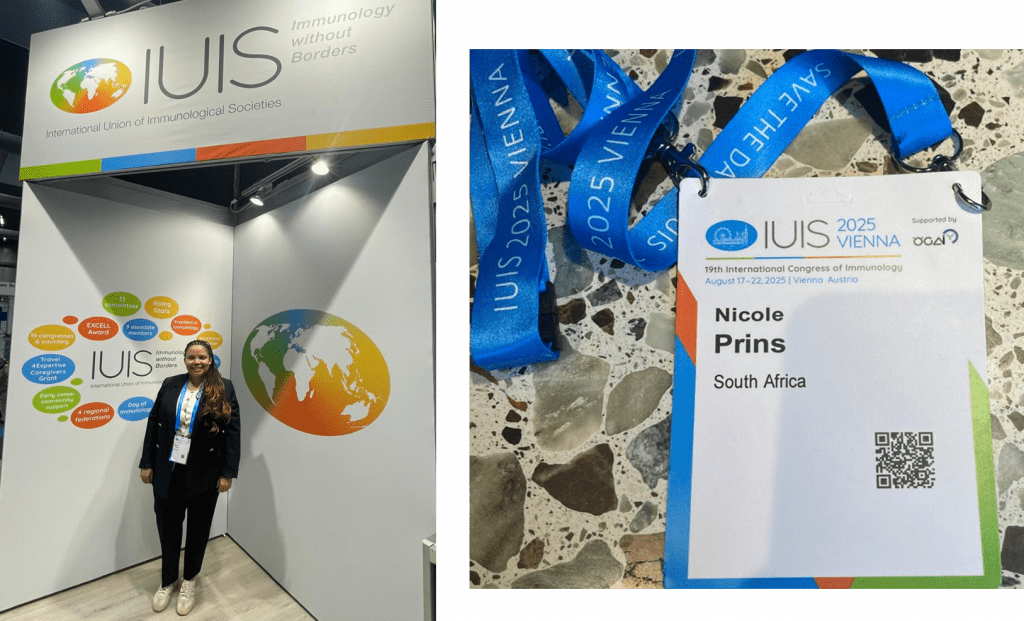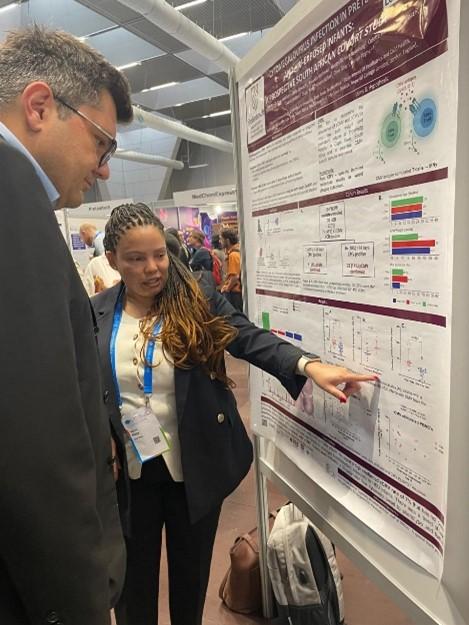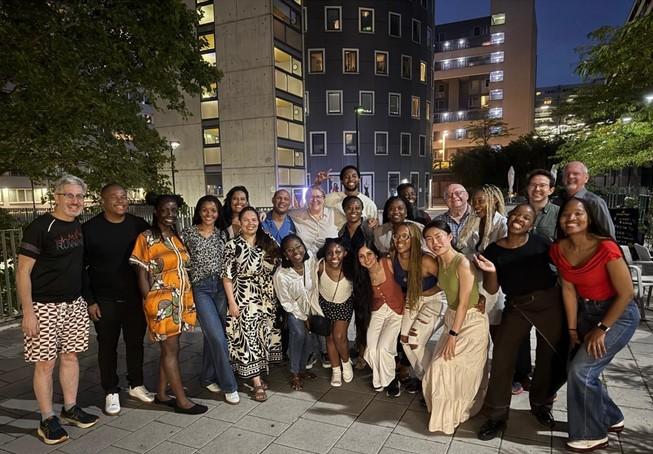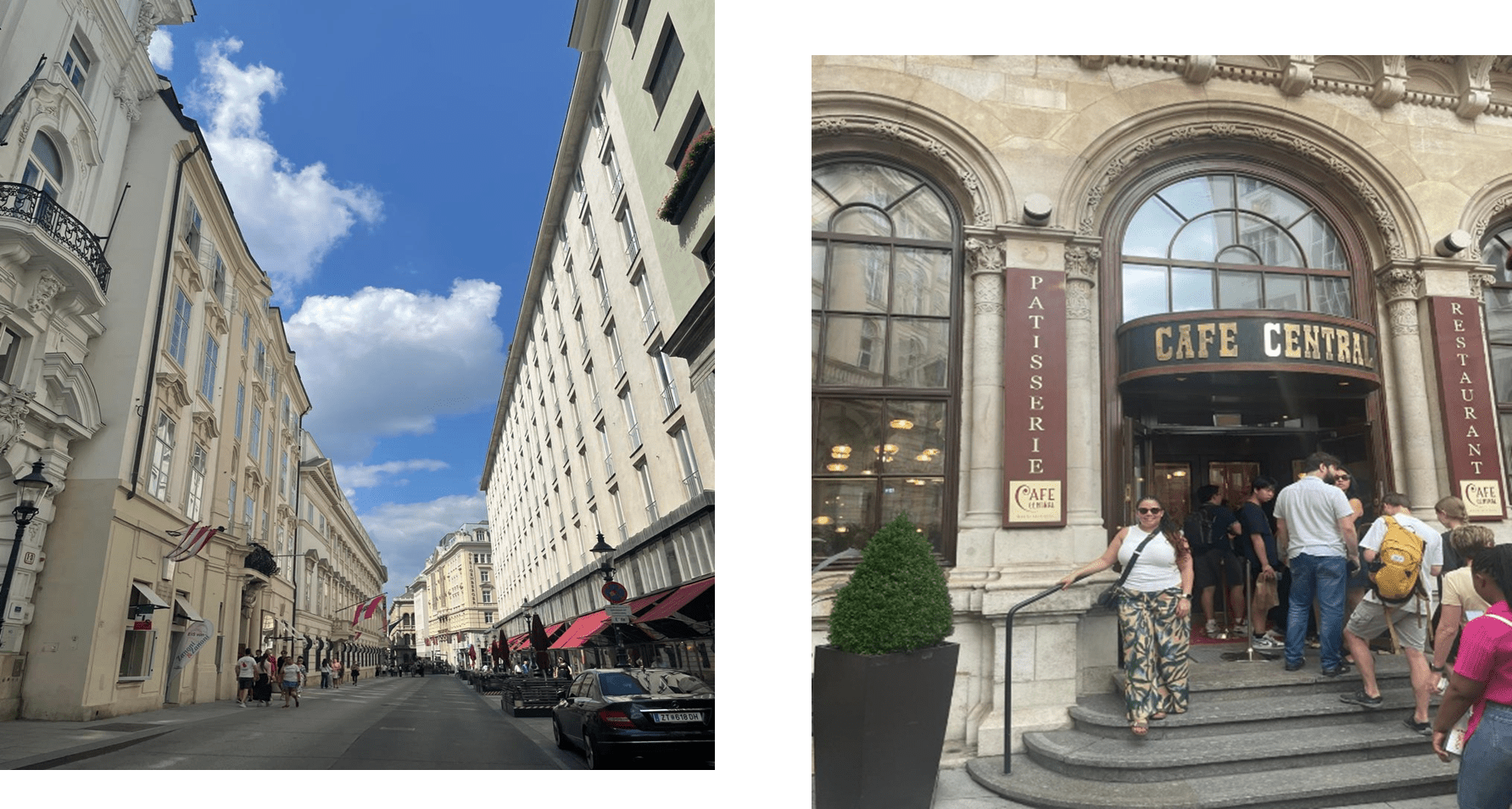Nicole Prins – TIGRIS Awardee and RIRCA Scientific Officer and MSc Student
The 19th International Congress of Immunology (IUIS2025), held in Vienna, Austria (17–22 August 2025), carried the theme: “Waltzing into the Future of Immunology: For a Better Health.” The congress highlighted how basic and translational immunology is shaping solutions for global health challenges—ranging from infectious diseases and cancer to autoimmunity and vaccine development.
I attended the congress as part of my MSc journey to present a poster titled:
Cytomegalovirus Infection in Preterm and HIV-Exposed Infants: A Prospective South African Cohort Study. My participation was made possible through sponsorship from my supervisor, Prof. Clive Gray, through the TIGRIS D43 Training Grant.
My goals in attending were threefold:
- To share my preliminary MSc findings with an international audience and gain confidence in presenting my work.
- To learn about cutting-edge research and discoveries in immunology from world-leading scientists.
- To network and build collaborations that would enrich my MSc journey and support my plans of pursuing a PhD.
Presenting my work in Vienna was both exciting and affirming. It was exciting to have my abstract accepted and to share my findings at the prestigious IUIS 2025 immunology conference. It was equally affirming to realise that the research we conduct at the Reproductive Immunology Research Consortium in Africa (RIRCA), under the leadership of Prof. Gray and Dr Helen Payne, is of high quality and on par with international standards.
The interest and encouragement I received from global experts emphasised the relevance of studying CMV in African neonatal populations, which is an area that remains underexplored compared to the extensive work from the Global North. This validation reassured me that my research is not only valued but also urgently needed.
Highlights of the Scientific Programme
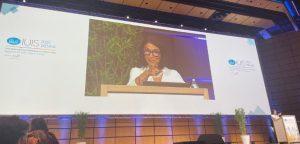 The congress opened with an inspiring talk by IUIS President Prof. Miriam Merad, who delivered an electrifying talk emphasising the responsibility of researchers to communicate their work more effectively to the broader public —particularly in rebuilding trust in science in the post-COVID era.
The congress opened with an inspiring talk by IUIS President Prof. Miriam Merad, who delivered an electrifying talk emphasising the responsibility of researchers to communicate their work more effectively to the broader public —particularly in rebuilding trust in science in the post-COVID era.
The highlight of the welcome ceremony was undoubtedly the waltz performance, which beautifully showcased an integral part of Austrian culture and set a fitting tone for the congress under the theme “Waltzing into the Future of Immunology.”
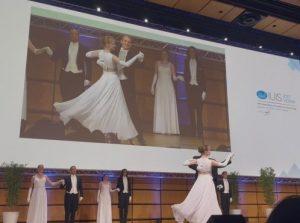 The keynote speaker was Prof. Shimon Sakaguchi, renowned for his discovery of regulatory T cells (Tregs). His lecture explored innovative strategies for converting disease-causing T cells into Tregs, a potential treatment for autoimmune and immune-related diseases. The talk focused on generating induced regulatory T cells (iTregs) in vitro by creating conditions that promote the expression of key Treg-specific genes such as FoxP3. These iTregs hold promise for adoptive cell therapy, where they could be applied to treat conditions such as autoimmune diseases, helping to suppress harmful immune responses directed against the body’s own tissues.
The keynote speaker was Prof. Shimon Sakaguchi, renowned for his discovery of regulatory T cells (Tregs). His lecture explored innovative strategies for converting disease-causing T cells into Tregs, a potential treatment for autoimmune and immune-related diseases. The talk focused on generating induced regulatory T cells (iTregs) in vitro by creating conditions that promote the expression of key Treg-specific genes such as FoxP3. These iTregs hold promise for adoptive cell therapy, where they could be applied to treat conditions such as autoimmune diseases, helping to suppress harmful immune responses directed against the body’s own tissues.
Another highlight of Day 1 was the Rising Stars session. I particularly enjoyed the presentation by Dr. Marion Brunck, which focused on how maternal obesity disrupts breastmilk immunity. She shared snippets from her latest publication, a scoping review on the current knowledge of leucocytes in human breast milk. Her talk sparked my interest in exploring how the breast milk samples collected in my own study can be used to better understand how maternal health influences infant immunity.
Highlights from the rest of the week included talks by Prof. Theresa Rossouw, the current president of the South African Immunology Society (SAIS). Her talk focused on systemic immune activation during HIV infection.
The congress concluded with a powerful lecture by Prof. James Allison, who received the 2018 Nobel Prize for his pioneering discovery of cancer immunotherapy through immune checkpoint inhibitors targeting CTLA-4 and PD-1. In addition to outlining the scientific breakthroughs, he shared personal stories of patients whose lives have been transformed by these therapies, many of whom he still keeps in contact with.
I particularly enjoyed this talk, as it deepened my understanding of the role these molecules play in regulating immune responses, which is especially relevant to my own work, as I will be examining infant PBMCs and both CTLA-4 and PD-1, which are included in my 20-marker immune phenotyping panel.
Overall, the closing events reinforced the congress theme, reminding participants of the role of immunology in building healthier societies.
Insights and Learnings
Through attending IUIS, I gained:
- A deeper understanding of neonatal immune ontogeny and its relationship with viral infections.
- A renewed sense of purpose about the global impact of my work, particularly in bridging research gaps between Africa and the global community.
These learnings will shape both my MSc thesis and the aims of my upcoming PhD, ensuring that my work continues to contribute toward “better health” in line with the congress theme.
Networking & Collaboration
The congress provided excellent networking opportunities. I connected with African immunologists working on paediatric infections, as well as researchers from Europe and the US who are exploring CMV and related pathogens. These conversations opened doors for potential collaboration on flow cytometry panel design, immune phenotyping comparisons, and data-sharing opportunities.
The sense of belonging to a global African immunology community was especially meaningful.
Vienna Experience
This trip was my first time travelling to Europe. While I am deeply committed to the idea of being an African scientist working in Africa, I could easily envision myself living there. The sense of safety, the efficiency of public transport, and the ease of exploring more of Europe were striking—especially in contrast to the high cost of travel within Africa. Vienna, with its rich history and culture, provided a stunning backdrop to the congress. I explored the city centre, visited St. Stephen’s Cathedral, and experienced the charm of Viennese coffee houses, including the iconic Café Central. These cultural encounters enriched my trip and made the congress memorable in ways that extended well beyond the scientific programme.
Conclusion
Attending IUIS2025 under the theme “Waltzing into the Future of Immunology: For a Better Health” was a transformative experience. I not only presented my research but also learned from world-leading experts, gained fresh perspectives, and built valuable networks.
The congress reinforced that my work on CMV in African neonates is timely, relevant, and of global significance. The insights gained will directly strengthen my MSc thesis and inspire the design of my PhD project, particularly in high-dimensional immune profiling and CMV strain analysis.
Looking ahead, I am motivated to apply what I have learned, foster international collaborations, and continue contributing to the future of immunology and to better health in Africa and beyond.
Article by Nicole Prins






